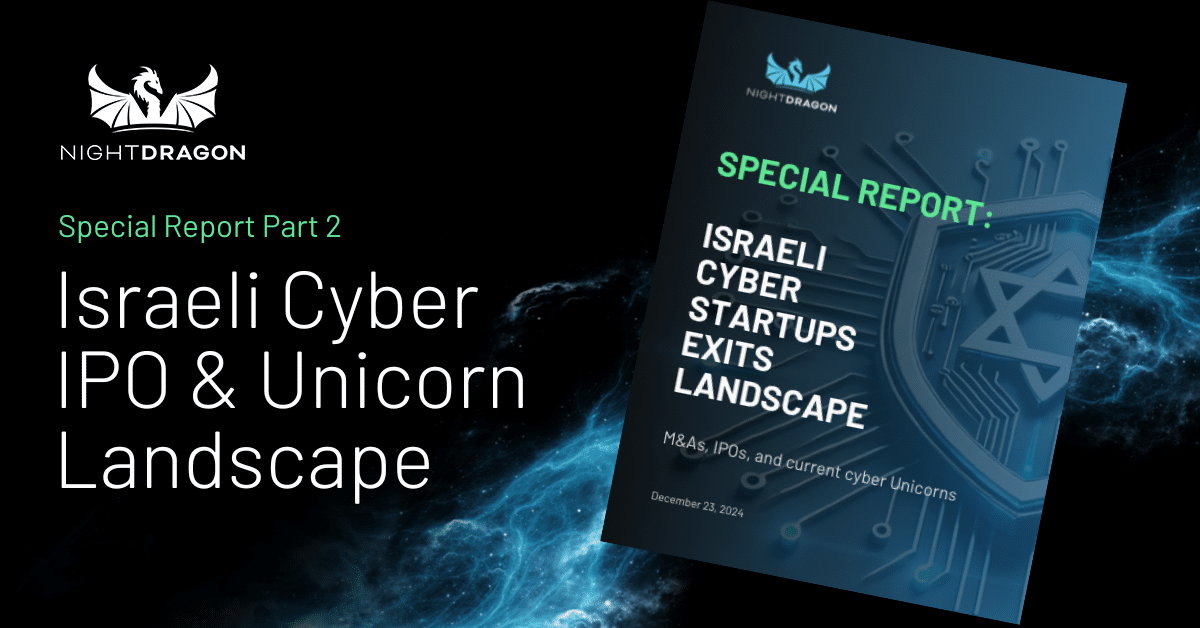NightDragon is excited to share an end-of-year report on the Israeli Cyber Exits Landscape (all Israeli cyber M&As and IPOs) as well as Israeli cyber unicorns. Today we have 21 Israeli cyber unicorns worth an aggregate value of $64B who have raised an aggregate $12B of funding in their company’s lifetimes thus far.

In this second part of the blog series, we will analyze the IPO and Unicorn landscape in Israel. The full report can be downloaded below. All data is of the date of publication on December 23, 2024.
If you missed our first blog focused on Israeli cyber M&A trends, view that here.
*Data sources: Pitchbook, IVC, Startup Nation Finder, well-regarded PR publications, first-hand information.
What is the IPO landscape for Israeli cyber startups? What are the results of startups that exited via IPO, compared to M&A?
Five Israeli cyber companies went public in the last six years, in addition to Cyabra announcing its intent to go public via SPAC in July 2024. Compared to the exit value generated by M&As of $23B, the Israeli IPOs saw a combined value of $18B on the day of their IPO – today, this number is closer to $13B, meaning they are at a combined valuation of $13B today, down 34% overall.
When looking at the table below, you can see that it does take twice as long to IPO as it does to be acquired via M&A, and the average exit:fundraising multiple is higher for M&A. However, to put things into perspective, the median valuation at IPO of $3.3B is 30X that of M&A, and the combined value generated of just the five IPOs has amounted to almost as much as the combined value of all 116 exits.
Median Exit Value Realized by Type:
| IPO: | $3.3B |
| M&A | $108M |
Median Exit:Fundraising Multiple by Type:
| IPO: | 5X |
| M&A: | 7X |
Median Time (Years) to Exit by Type:
| IPO: | 8 years |
| M&A | 4 years |
What is the IPO landscape for Israeli cyber startups? What are the results of startups that exited via IPO, compared to M&A?
The main cyber IPOs over the last six years amounted to an aggregate value of $18B at the time of IPO. Those same companies have a combined market cap of $12.7B today.
There isn’t much repeatability in the IPO data, given the small dataset. The lack of IPOs is not specific to the Israeli market, and Israel saw IPOs outside of cyber including Freightos, Fiverr, Innoviz, Taboola, and others. However, it is clear that the Israeli cyber market specifically is more skewed towards exit via M&A rather than IPO.
What stage did a company become a unicorn? How long did it take to become a unicorn?
Most current cyber unicorns became unicorns in 2021 and most did so in their series C or D fundraising rounds.
Of the companies that became unicorns in 2021, it took them an average of 5 years to do so. Of those that became a unicorn before or after 2021, it took them 6 years on average. Thus, most companies become unicorns 5-6 years after being established, though COVID slightly accelerated it.
Who is more successful: first-time founders or serial entrepreneurs?
40% of current cyber unicorns are founded by first-time cyber CEOs and 60% are founded by CEOs who are second, third, or fourth timers. First-time unicorn CEOs become a unicorn at earlier stages – majority during series C fundraising rounds – compared to serials who did it at rounds E/F. This shows that the more experienced founders were more conservative in their fundraising strategies.
What were some of the trending categories to become a unicorn?
The trending categories for unicorns follow the M&A trends: Cloud Security, Data Security, DevSecOps, and Network are the top categories. These are broad categories, but that is because once a company gets to this stage, they must offer a platform, not a feature, so their respective category is wider than, let’s say, non-human identities, which is currently a smaller/more specific category from the broader identity space.
What were the average ARR multiples?
The average ARR multiple of current unicorns is 31X, meaning the startup valuation is on average 31 times its current ARR. The highest is 108X, the lowest is 11X. (Please note that this figure represents data from the majority, not all, of unicorn companies due to sensitive or undisclosed financials). To put things into perspective, the top 5 public cybersecurity companies in the USA (PANW, CRWD, FTNT, ZS, NET) are currently trading at an average EV/Revenue ratio of 15.4X. This shows how different the private market values companies compared to the public.
Summary
In summary, the Israeli cyber market is doing well amidst turbulent global and local times. Foreign investors continue to be extremely active in Israel, and through the toughest of times, the Israeli cyber ecosystem has shown resilience seen nowhere else.
There is a clear cyber playbook that has been established by the top cyber-focused VCs in Israel over the last six years that has shortened time to success. Startups that follow this playbook and receive funding from the right players, both locally and globally as they continue to grow, will significantly raise their chance of success.
With more than $41B in aggregated value generated over the last six years from our 116 M&As + 5 IPOs, in addition to an aggregate current valuation of our current 21 cyber unicorns, which amounts to more than $64B, the Israeli market stands as one of the most attractive ones worldwide, and we are proud to support its continued growth.
